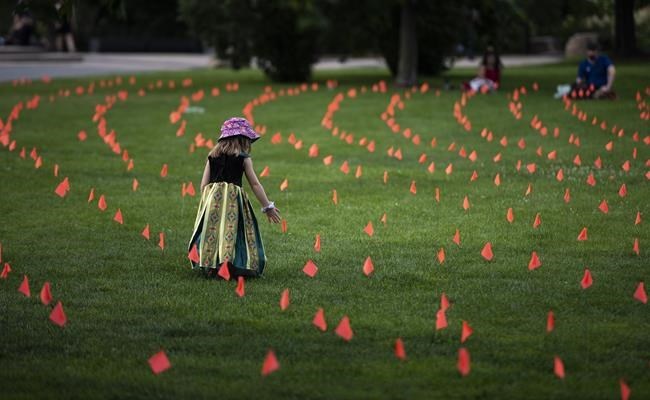WAUZHUSHK ONIGUM NATION — A First Nation in northwestern Ontario says it has found 22 areas where human remains may be buried at the site of a former residential school.
The Wauzhushk Onigum Nation, near Kenora, Ont., was "alerted" to the areas at the site of the former St. Mary's Residential School in mid-August after using a cadaver dog to conduct ground searches in and around the old school grounds.
The community announced earlier this year it had discovered 171 anomalies at the old site with most of them being potential unmarked burial grounds.
In a statement, the community says 19 of the 22 new areas the cadaver dogs found overlap with areas identified by residential school survivors as potential burial sites from when it was in operation.
The community is expecting to release a full report of its investigation early next year that is to include findings from searches using the cadaver dogs and ground-penetrating radar, as well as testimonies from survivors and archaeological assessments.
More than 6,000 children attended St. Mary's during its 75 years of operation, with the National Centre for Truth and Reconciliation documenting 36 of those children dying while attending the school.
The school was affiliated with the Roman Catholic Church and was operated by the Oblates and Grey Nuns.
The community has been guided by a council of elders and survivors to move forward with the search that also honours customary protocols.
Chief Chris Skead commended the council and other survivors for their strength as the community continues its search.
"I honour you for standing firm, for sharing, for guiding (and) for showing us," he said Monday in a statement. "It is your testimony, your strength, your guidance that will continue to move us forward."
An estimated 150,000 First Nations, Metis and Inuit children were forced to attend residential schools over a century, and the Catholic Church ran about 60 per cent of the institutions.
Children attending the schools were punished for speaking their languages and practicing their culture. They were separated from their families and, in many cases, were subjected to psychological, physical and sexual abuse.
The Indian Residential Schools Resolution Health Support Program has a hotline to help residential school survivors and their relatives suffering trauma invoked by the recall of past abuse. The number is 1-866-925-4419.
This report by The Canadian Press was first published Oct. 30, 2023.
The Canadian Press

